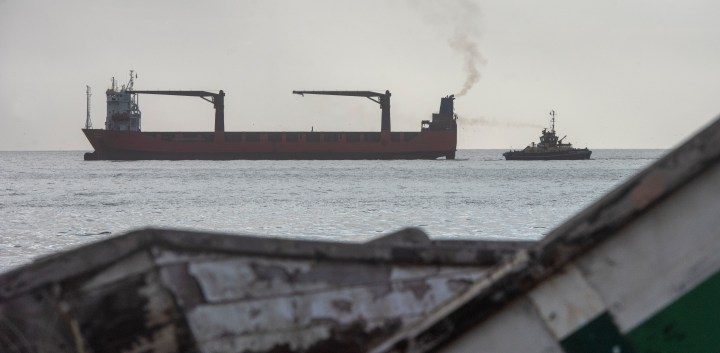PORT IN AN INTERNATIONAL STORM ANALYSIS
‘Non-alignment’ is not a real ANC policy, just a useful tool

Now invoked almost daily, the term was not much evident before the Ukraine invasion.
Ever since Russia invaded Ukraine on 24 February 2022, “non-alignment” has become the maxim of South Africa’s foreign policy, a concept brandished, like a silver cross at a vampire, whenever Pretoria is accused of failing to uphold its own fundamental values and those enshrined in the UN Charter by not condemning Russia’s aggression.
Non-alignment has been South Africa’s justification for abstaining from several resolutions of the UN General Assembly condemning Russia’s invasion, much to the annoyance of Ukraine and its Western allies, even if they begrudgingly accepted it.
But they became increasingly concerned as they saw more and more evidence of South Africa ditching professed non-alignment and siding openly with Russia.
Some of these instances were Defence Minister Thandi Modise attending a major security conference in Moscow; the ANC Youth League sending observers to – and warmly praising – Russia’s sham referendums to justify annexation of Ukrainian provinces; an ANC visit to Moscow to meet Russian President Vladimir Putin’s party; the joint naval exercise with Russia and China off the KwaZulu-Natal coast in February; and the secretive docking of the US-sanctioned Russia ship Lady R in Simon’s Town in December when it loaded secret cargo.
US ambassador to South Africa Reuben Brigety said last week he would bet his life the Lady R uploaded weapons and ammunition for Russia – “which does not suggest to us the actions of a non-aligned country”.
That raises questions: Was South Africa ever really non-aligned? Or has “non-alignment” been a convenient excuse for not criticising its ally Russia?
Word search South Africa’s 2011 White Paper on foreign policy – the most recent document on the subject – and “non-aligned” and “non-alignment” don’t come up once.
A search of the National Interest paper of last year reveals just one reference: “The National Interest is also shaped through solidarity and mutual interests with the region, continent and the South, including through the Bandung Principles, the Non-Aligned Movement (NAM), the Group of 77 and China and the UN. The National Interest in turn shapes key principles of … foreign policy.”
The Bandung Conference laid the foundation for the NAM during the Cold War when developing countries banded together to avoid being forced to take sides.
The ANC international relations policy document of 2017 states: “It should remain our priority to strengthen the Non-Aligned Movement and Group of 77, to continue to play their vanguard role in an international system that is skewed in favour of the West.”
So, non-alignment per se is nowhere in documents from before 24 February 2022 as a priority value or posture, apart from the NAM, which in any case is not an organisation South Africa has given much time to. And that last paragraph suggests the ANC regards the NAM not as a group of nations standing aloof from big-power contestation, but rather as a coalition of countries to counter the presumed dominance of the West. Was that really non-aligned?
It was only after Russia invaded Ukraine and the West came to Ukraine’s defence that “non-alignment” really entered the vocabulary as a policy. The ANC’s 2022 international relations document, for example, stated that since the invasion “powerful Western forces and their proxies in South Africa push for the country to shift from non-alignment to support Ukraine”.
Clayson Monyela, head of public diplomacy at the Department of International Relations, wrote in October: “Our non-aligned position on the Russia-Ukraine conflict mirrors that of the global South and developing countries… South Africa pursues an independent foreign policy, as do members of the NAM, and as a collective we refuse to be bullied into taking sides in battles of geopolitical contestation.”
Perhaps one could defend the government by arguing that non-alignment was there but dormant until Russia’s invasion of Ukraine heralded a new Cold War. Certainly these events have brought the concept of non-alignment into sharper focus.
But it is hard not to see the heavy reliance on it as clutching at a convenient weapon to fend off criticism of its failure to criticise Russia for an act that ought to offend almost all the values the government and ANC stand for – including anti-colonialism.
What could be more colonial and imperialist than invading your neighbour, targeting civilians and pulverising cities; threatening nuclear war and claiming territory?
Jakkie Cilliers, chairperson of the Institute for Security Studies, says “non-alignment” is more a useful tool than a fundamental principle of the ANC and government.
The government justifies membership of the BRICS group as an expression of non-alignment. “But if you look at early pronouncements on the role of BRICS, it was really that BRICS served as a counterweight to the G7.”
Perhaps India sees BRICS as non-aligned. “But that’s not how the ANC or Russia or China see BRICS.”
How could China and Russia be opposite poles to the West in the supposedly emerging new bi-, tri- or multipolar world order the ANC welcomes – as well as non-aligned?
It is clear that if “non-aligned” means equidistant from both sides in a polarised world, as presumably it should, that does not describe South Africa’s posture.
The ANC says Russia’s invasion of Ukraine is no worse than the US invasion of Iraq in 2003. Perhaps. But the ANC vociferously criticised the US for that, yet remains silent on Russia’s attack on a democracy. DM
This story first appeared in our weekly Daily Maverick 168 newspaper, which is available countrywide for R29.






 Become an Insider
Become an Insider
Comments - Please login in order to comment.